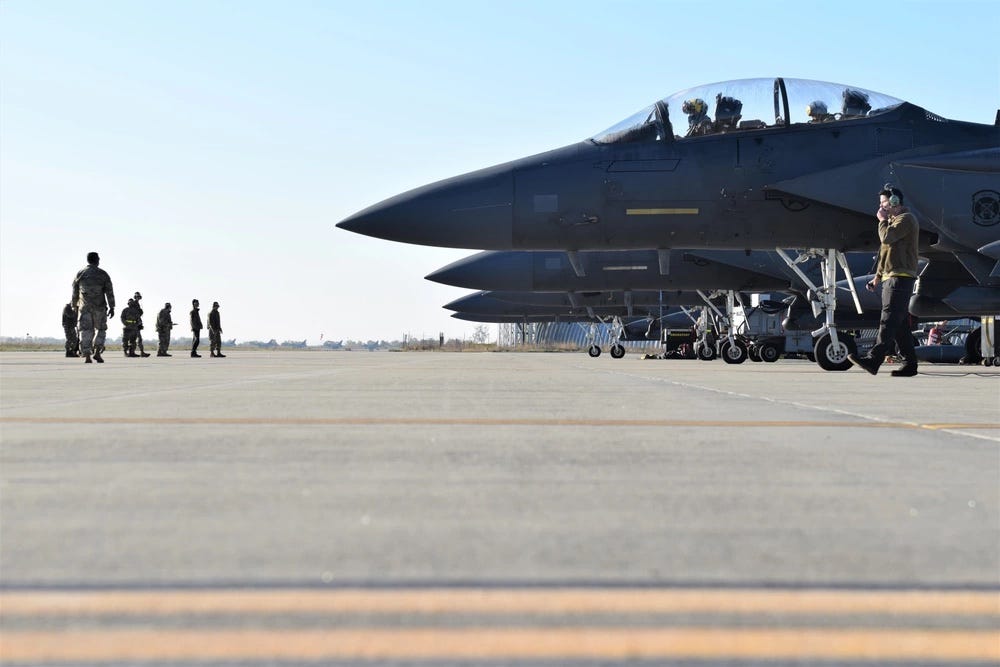A no-fly zone means NATO shooting down Russian jets. We must not do that
NATO must remain resolute and sober. If we let our emotions get the best of us, we may suffer far more harm than anything that has yet befallen Ukraine
The following was originally published on March 8, 2022 in The Guardian.
https://www.theguardian.com/commentisfree/2022/mar/08/ukraine-no-fly-zone-nato-russia-war
Photo: DVIDS
With every passing day, with every image and video that shows how Russia is destroying Ukrainian cities and killing civilians, the calls for punitive measures against Moscow rise. While the sentiment is understandable, we need a strong dose of reality to curb some of the more emotional impulses which, taken too far, could not only fail to make our country safer—but result in the U.S. stumbling into a catastrophic war that can be avoided.
The war between Russia and Ukraine started horribly and has only intensified since. Kharkiv has been devastated by heavy Russian bombardment. The port city of Mariupol could fall to Russian forces any moment, and vicious street fighting gets closer to the heart of Kyiv by the day. Accurate casualty figures are as yet unknown, but they are significant for the Ukrainian civil population. The reaction from the western world against Moscow has been immediate and severe.
Russia has seen the most punitive and comprehensive set of sanctions levied against another country since the second world war. Moscow has been almost entirely cut off from the Swift banking system. News organizations around the world have ceased operations there and curtailed Russian media outlets in the west. Businesses the world over have suspended operations in the country. All of the measures have taken a serious toll on the Russian population.
To date, however, none of it has had any discernable impact on Putin’s prosecution of the war, as his military machine continues its march through Ukraine. That apparent lack of success has many in the west contemplating the imposition of even harsher measures to punish Moscow with the eventual hope of forcing Putin to end the war and withdraw his troops.
While it is entirely reasonable and appropriate to impose a serious cost on Russia for their grossly unnecessary war of choice, the west must stop to consider the ramifications of its policies before taking further action. If we let emotion have too much sway in our next steps, we could perversely worsen, materially, the West’s collective security.
Some of the options under consideration from various quarters include not just sending Kyiv more arms and ammunition, but increasingly sophisticated weapons such as air defense systems, modern fighter jets, and more advanced missile systems. The governments of some European countries, such as Sweden and the UK, have not prevented their citizens and military veterans from going to Ukraine to fight the Russians. But the most dangerous idea being given increasing consideration is the establishment of a no-fly zone over Kyiv.
No less than three retired four-star American generals, all former NATO supreme allied commanders, have given some degree of support to the idea of a no-fly zone in Ukraine. One of them, General Philip Breedlove, proposed a no-fly zone for humanitarian purposes, suggesting it might be tolerable to Moscow if the U.S. says “we are not going to fire on you unless you fire on us.”
Such distinctions are obviously pointless: if we enforce the zone, then by definition we have to shoot down anything that flies into it, whether it attacks our planes or not. And if anyone had any doubts about what Russia’s response would be to one of its jets being destroyed in a no-fly zone, Putin put them to rest on Friday when he said he would consider any attack in Russian aviation to be an attack on his country and respond in kind.
President Zelenskiy has been outspoken in urging NATO to ignore this danger and impose a no-fly zone regardless of Putin’s comments. On Friday, he tried to shame NATO into the move by saying the alliance leaders would be responsible for Ukrainian deaths if they didn’t intervene on his behalf. “All the people who will die from this day will die because of you,” Zelensky said, accusing the alliance of “weakness” and “disunity.”
While Zelensky’s desire is understandable—his nation is under vicious attack—the west must resolutely refuse to be drawn into the war through the Ukrainian leader’s emotional appeal. As bad as it is that millions are suffering in Ukraine, western leaders have obligations, first and foremost, to safeguard their populations. Fighting Russia on behalf of Zelensky would expose the populations of the entire alliance to potential attack by Moscow, which could escalate to nuclear warfare.
It is crucial the west does not overreact to the war, as bad as it is. The sanctions currently in place are unprecedented in their severity and will impose a penalty on Putin that it could take upwards of a decade from which to fully recover. Moreover, regardless of how the war ends, Putin’s military is going to be severely weakened in the aftermath. Because of the strong sanctions, it would likely take Putin over a decade to rebuild Russia’s military strength to its pre-war position—which has been exposed as being far weaker than most imagined—much less to be capable of invading a NATO country.
Meanwhile, because Putin has shown he is willing to use force, virtually every European country is now going to significantly increase its defense spending and put real emphasis on modernizing their own self-defense capacity, as evidenced by Berlin’s $113bn investment in its defense budget.
The bottom line is that if NATO remains resolute and sober in its response to Putin’s invasion of Ukraine, refuses to get drawn into a no-win war, western security for the foreseeable future will be strengthened. Let our emotions get the best of us, however, and risk widening the war, and we may suffer far more harm than anything that has yet befallen Ukraine.




